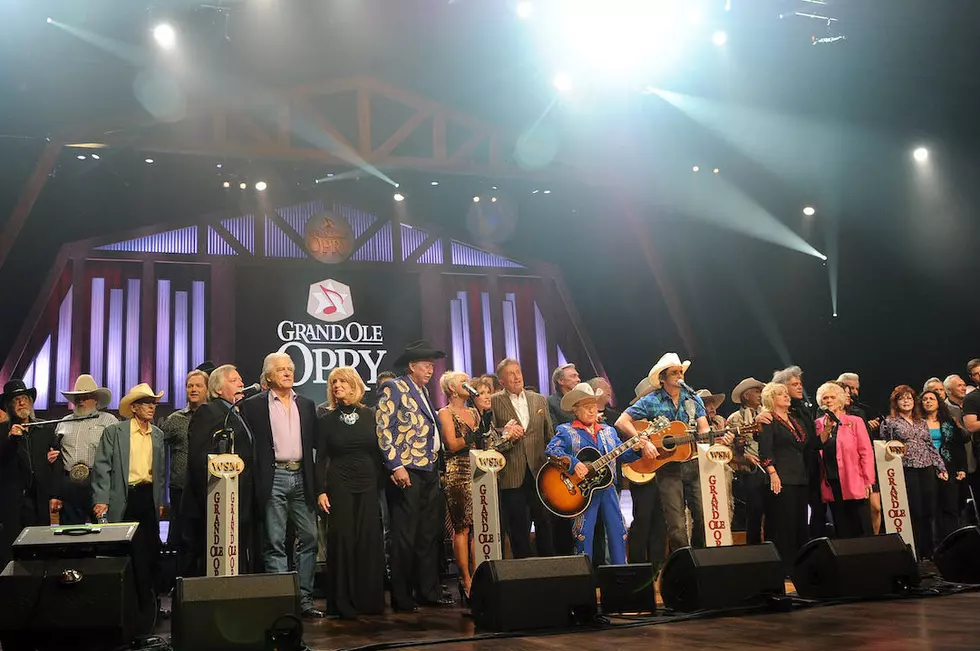
‘Will the Circle Be Unbroken': The History of Country Music’s Most Iconic Song
Any Grand Ole Opry regular can attest to the importance of "Will the Circle Be Unbroken," the country music standard that often kicks off or closes an evening of performances on the genre's most iconic stage. It was the last song to be performed on Ryman Auditorium stage before the Opry moved to its current home, the Grand Ole Opry House, in 1974, and the first song to be performed at the Opry House after it re-opened following Nashville's devastating 2010 flood.
"Will the Circle Be Unbroken" is an anthem of hope and perseverance, a message that life -- and music -- continues in the face of adversity, and even after death. It connects generations of country musicians and fans, linking the genre's community today to its long-gone heroes.
It makes sense that "Will the Circle" conveys such a sweeping, powerful and universal message: It was originally written as a hymn, in the very early 20th century. Songfacts reports that it was originally published in 1908, its lyrics written by Ada Habershon and its music by Charles H. Gabriel, two well-known gospel writers and composers of the time.
Nearly three decades later, the Carter Family was rising to prominence as one of country music's pioneering acts. According to NPR, patriarch and harmony vocalist A.P. Carter would often travel around the country, foraging for gospel tunes and old-time standards that the group could reconfigure in their own style. It was likely during one of these jaunts that he came across "Will the Circle," or as the Carter Family would ultimately record it in 1935, "Can the Circle Be Unbroken (By and By)." Released as a 10-inch, 78 RPM single, the country-inflected gospel number became the Carter Family's biggest success.
Aside from retooling the song's style to be more in line with what would come to be known as country music, the Carter Family also made changes to its lyrics. What was originally an open-ended hymn about rejoining lost loved ones in an eternal life after death ("When you close your earthly story / Will you join them in their bliss?") became a more specific storyline about attending a mother's funeral, finding joy in her ascension to Heaven despite feeling grief and loss.
The story's meaning became even more personal after June Carter Cash, daughter of Carter Family member Maybelle Carter, requested that her loved ones sing "Will the Circle Be Unbroken" after her death. Carlene Carter -- Carter Cash's daughter with her first husband, Carl Smith -- says the song came to be a deeply meaningful testimony to her mother's legacy.
"It has a different meaning to me now ... than it did when I first learned it and first sang it live in front of an audience," Carlene, step-daughter to Johnny Cash, explains to NPR. "It was a celebration to me then — I had not experienced loss in the way that that song actually is about. Being older and having gone through the loss of my mother and my grandma, I feel closer to my people and to my legacy of family when I sing that song."
After the Carter Family popularized the song, many other country artists recorded versions of "Will the Circle Be Unbroken." The Allman Brothers Band performed it at Duane Allman's funeral, after he died in a motorcycle accident in 1971. A year later, in 1972, the Nitty Gritty Dirt Band gathered Doc Watson, Earl Scruggs and many other bluegrass and country icons on a 42-song project called Will the Circle Be Unbroken; the record's version of "Will the Circle" includes Maybelle Carter herself.
A Look Back at the Grand Ole Opry Through the Years
More From TheBoot









